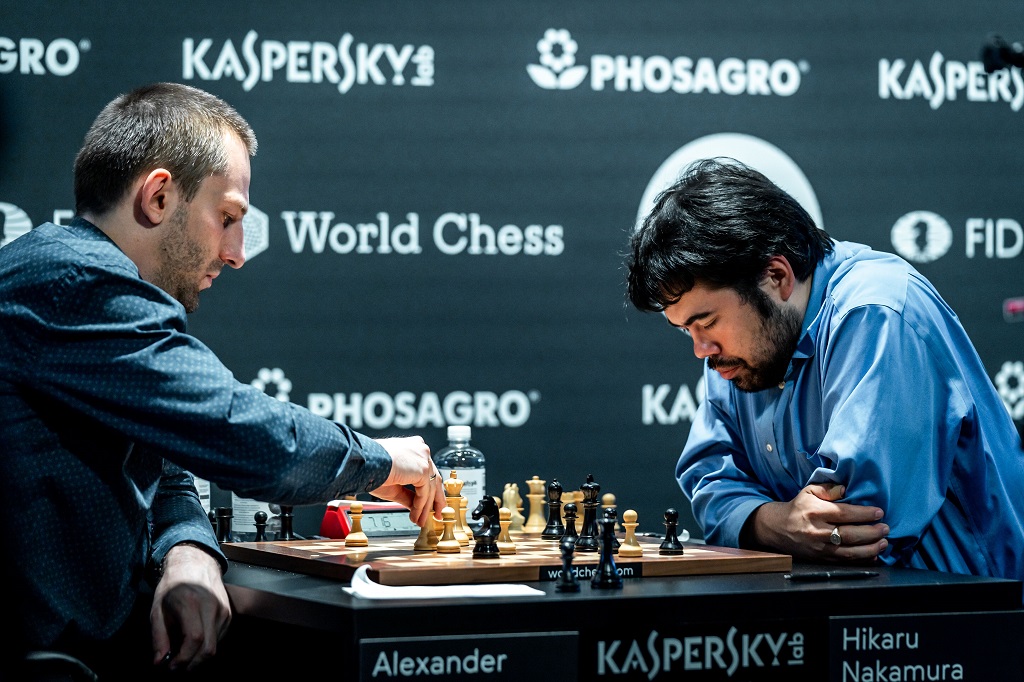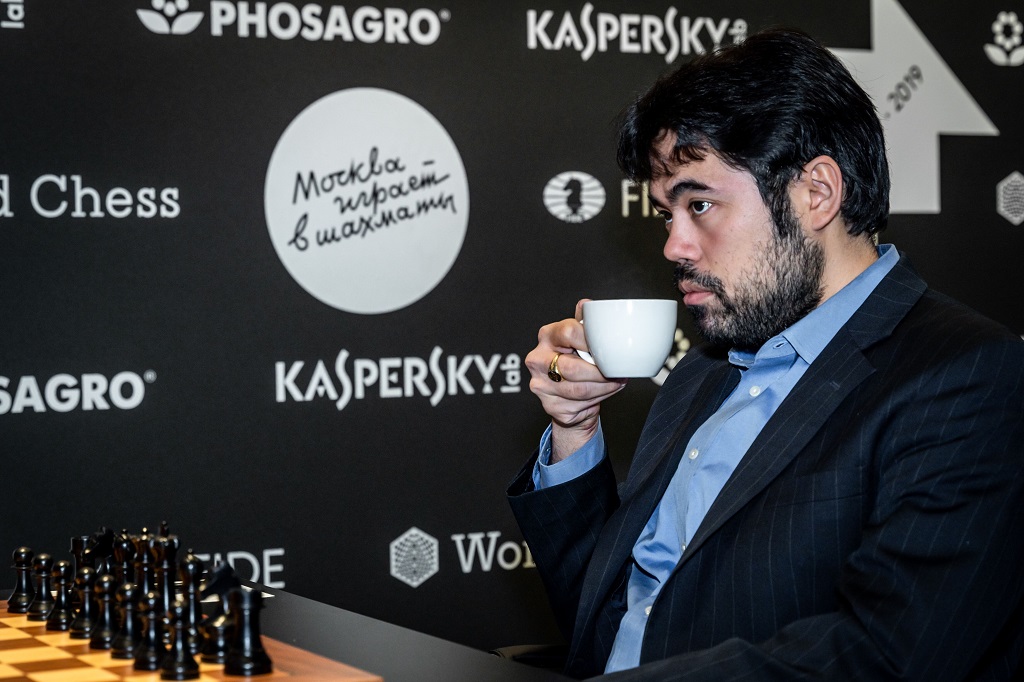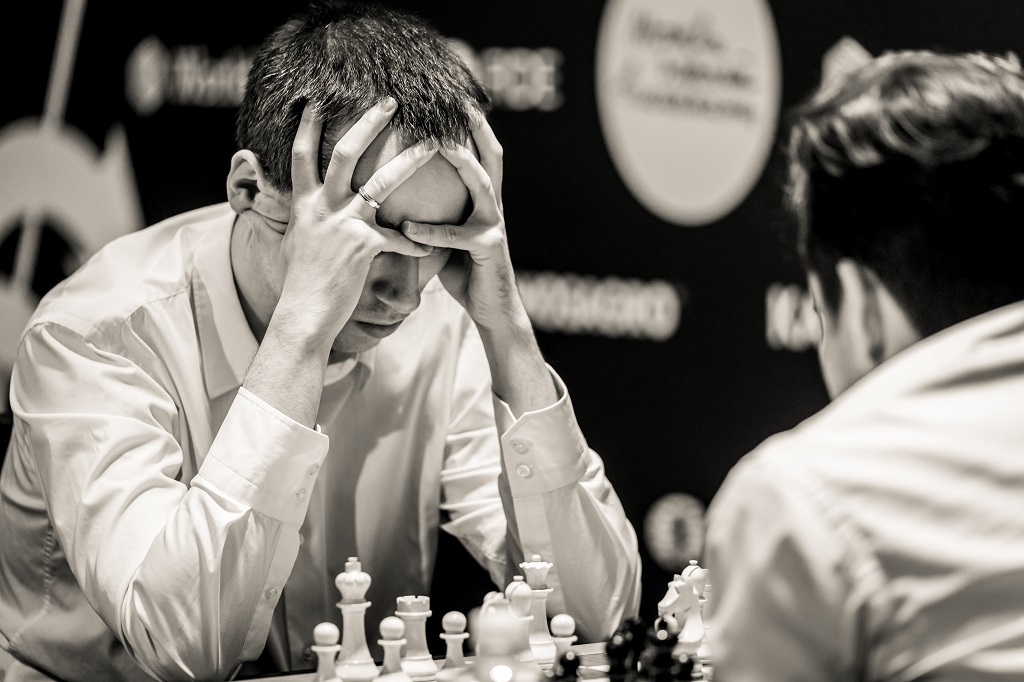


In his sixth classical game of the event, Hikaru Nakamura went past the time control for the first time in the tournament — of course, he did play more than forty moves in the rapid tie-breaks. In his closing balance, the American was left with three points in the GP overall standings, with his strength in quicker time controls a big asset for the future in this format, as was proven in his match-ups against Teimour Radjabov and Daniil Dubov. Nakamura will also play in Jurmala/Riga (second leg, July) and Hamburg (third leg, November).

Naka will play in the next two GP events | Photo: Niki Riga / World Chess
In his second game against Grischuk, Hikaru played a line he had used repeatedly in the recent past. Alexander declared afterwards that, at the same time, he "expected and [did] not expect [this variation]", as he thinks it is a very difficult line for Black. The ensuing position is highly complicated, with Grischuk explaining that the computers tend to change their assessments when they evaluate this sort of setups. The Russian was within his home preparation until move 20.
Between moves 21 and 26, the players spent 69 minutes (Grischuk) and 78 minutes (Nakamura), proving how tactically complicated the position actually was. By then, White was already in the driver's seat, although only a precise handling of the position would turn his edge into something tangible. According to Hikaru, his problems began after a strategical mistake on move 25:
Naka explained that he played 25...♚h8 because he did not foresee Grischuk's 26.♗d3. Hikaru declared: "I think it's still okay, but everything is going the wrong way — if anyone is pressing it's White". In fact, Black's position started to collapse and, shortly before the time control, White found a forcing continuation that left him completely winning:
Hikaru's 37...♞c4 allowed 38.♘xd8 ♞e3+ 39.♔f2 ♞xc2 40.♘xf7+ ♚g8 41.♘xe5 and White is winning.

Alex Grischuk is the first finalist in Moscow | Photo: Niki Riga / World Chess
Grischuk is the first finalist in Moscow. So far, he knocked out Sergey Karjakin and Nakamura in the classical phase, while he defeated Wesley So on tie-breaks. His performance in classical chess has netted him 8.4 rating points, which leaves him tied with Nepomniachtchi in the live ratings list — thus, they share Russia's top spot in the world ranking.
He will now have two rest days before the final match-up. Will he follow closely the tie-breaks between Wojtaszek and Nepomniachtchi in order to prepare beforehand? Sasha responded:
I would watch it even if I didn't play this tournament. I just like watching such events.
After getting a big edge on the clock and deciding to avoid unnecessary risks in game one, Ian Nepomniachtchi quickly equalized with Black and ended up getting a comfortable 22-move draw against Radek Wojtaszek on Thursday. White played a sideline that transposed into a King's Indian structure which is not very dangerous for Black and, after some simplifications, the players decided it was in their best interest to decide the match on tie-breaks.
It remains to be seen whether the fact that Wojtaszek overcame rounds one and two without going through rapid tie-breaks will work in his favour or not. Nepomniachtchi is, after all, a particularly quick player, although he recently performed below expectations in Abidjan — he finished in shared last place in the Rapid, after losing five games and winning one. He might, therefore, try to transfer the battle to quicker time controls by using a solid strategy in the 25+10 games...

On to the tie-breaks | Photo: Niki Riga / World Chess
Radek repeated a line of reasoning we have heard once and again during this tournament:
It's better to make a draw instead of just start drifting and having some problems after that.
Does Nepo have a special strategy for the tie-breaks? His response was as clear as day:
Eteri Kublashvili: What do you think is the most important ingredient for success in the play-off match at your level?
Ian Nepomniachtchi: No idea (smiles). Seriously, no idea.
Commentary by GMs Evgeny Miroshnichenko and Daniil Yuffa